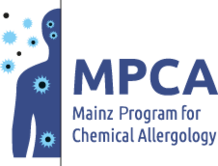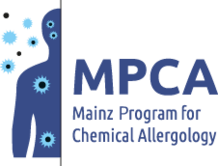
Mainz Program for Chemical Allergology, MPCA

The Max-Planck-Institute for Chemistry (MPIC) and the Institute of Translational Immunology (TIM) in Mainz recently joined forces to create an interdisciplinary center to study the effects of the human environment, such as pollution/reactive atmospheric gases, environmental temperatures or plant fertilization on the allergenic and immunogenic potential of common allergens.
Aims:
- to explore the reaction mechanisms and kinetics of chemical allergen modification
- to determine the role of nitration, oxidation, oligomerisation and other posttranslational environmental modifications of allergens in the potentiation or attenuation of allergenicity in in vitro and in vivo models
- to elucidate the role of the innate immune system and inflammatory processes, partly activated by the modified allergens themselves, in the development of allergies
- to develop strategies, to reduce the environmental impact of allergen potentiation
- to initiate and support clinical studies that are aimed at preventive and therapeutic measures to reduce the incidence of allergies, or induce their remission
Partners:
Ulrich Pöschl, Janine Fröhlich, Thomas Berkemeier, Multiphase Chemistry Department, Max Planck Institute for Chemistry (MPIC), Mainz
Detlef Schuppan, Institute of Translational Immunology, Johannes Gutenberg University (JGU), Mainz
Joachim Saloga, Department of Dermatology, University Medical Center of the Johannes Gutenberg University Mainz (JGU), Mainz
Michael Weller, Bundesanstalt für Materialforschung und -prüfung (BAM), Berlin
Link:
